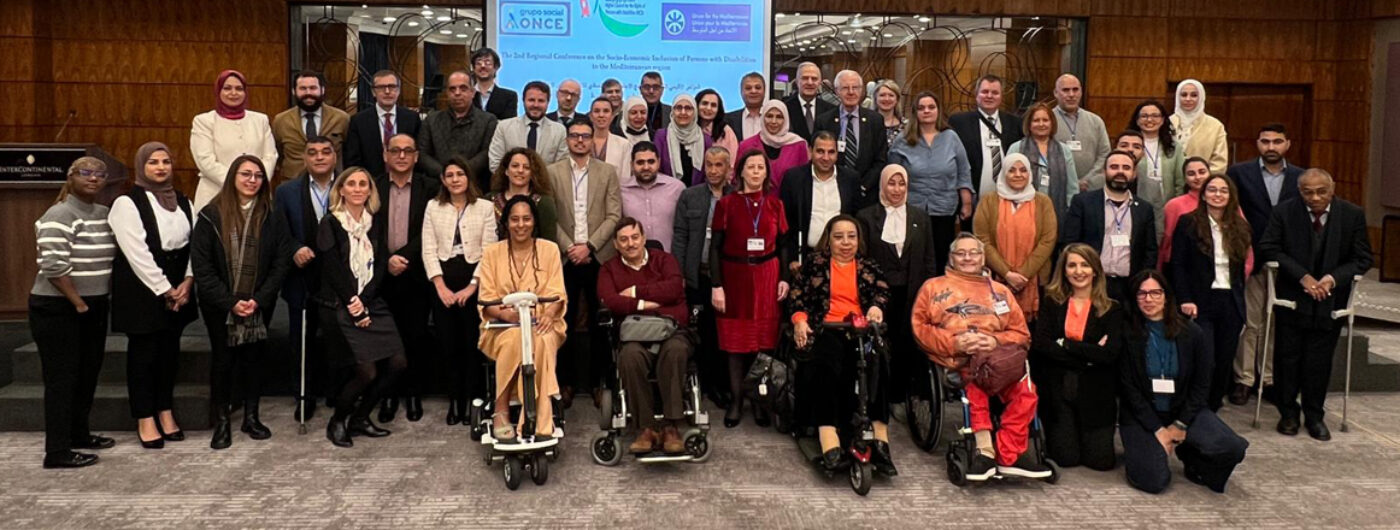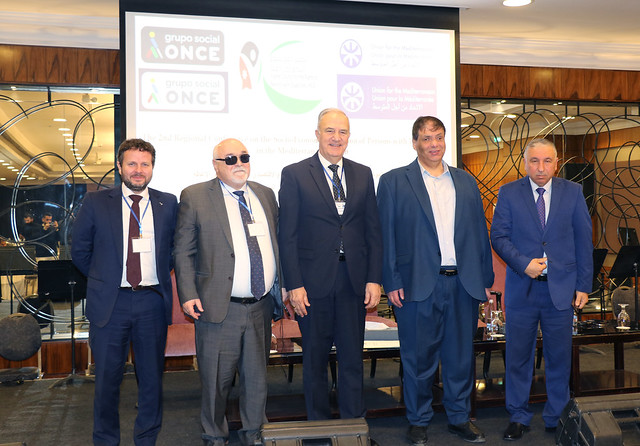
Euro-Med Agenda on the Socioeconomic Inclusion of Persons with Disabilities one step closer to reality following Amman conference
- The 2nd Euro-Mediterranean Conference on the Socioeconomic Inclusion of Persons with Disabilities took place on January 23 and 24 in Amman, with participants discussing the launch of the Euro-Med Agenda by the end of this year to address the underlying causes of discrimination against people with disabilities and set the preconditions for more inclusive policy responses.
- Attendees discussed the results of the First Situational Assessment of the Social and Economic Inclusion of Persons with Disabilities in the Euro-Mediterranean Region, identified obstacles and opportunities, and highlighted good practices and priority areas in an outcome document that will be presented before the United Nations in June.
- According to the First Situational Assessment of the Social and Economic Inclusion of Persons with Disabilities in the Euro-Mediterranean Region, people with disabilities are among the most marginalised in the Euro-Mediterranean region, an issue that is often aggravated by factors including unemployment, weak social protection mechanisms, gender inequality and the impacts of climate change. Up to 90% of people with disabilities are unemployed, a phenomenon that disproportionately affects women.
24 January 2024, Amman. The 2nd Euro-Mediterranean Conference on the Socioeconomic Inclusion of Persons with Disability, co-organised by the Union for the Mediterranean, Spain’s ONCE Social Group, and the Jordanian Higher Council for the Rights of Persons with Disabilities, took place today and yesterday in Jordan, bringing together public officials, institutional partners, and organisations of persons with disabilities (OPDs) with the aim of promoting more inclusive and equitable societies across the region.
The event served as a launch pad for the Euro-Med Agenda on the Socioeconomic Inclusion of Persons with Disabilities, a programme that will address the underlying causes of discrimination and set the preconditions for more inclusive policy responses. It is now one step closer to becoming a reality this year after participants identified priority areas and validated an indicative timeline for its approval.
“It is essential we take action to ensure inequality and discrimination do not become entrenched in the Euro-Mediterranean region as we can only move forward when it comes to safeguarding the rights of people with disabilities,” UfM Deputy Secretary General for Social and Civil Affairs John Paul Grech said. “I am convinced the Euro-Med Agenda, an excellent example of regional cooperation, will promote legislative measures that will help lead to concrete improvements in the lives of people with disabilities.”
“We have a historic opportunity to create a stable and permanent agenda, with funding, that promotes public policies for the inclusion of people with disabilities in all Mediterranean countries,” said Javier Güemes Pedraza, ONCE’s Director of International Relations.
“Hosting this important conference in Jordan reaffirms our country’s robust political will to promote the rights of persons with disabilities and to play a key role in mainstreaming disability rights and issues in social policies at the regional level. Having this event in Jordan during this difficult time in the Middle East sends a very important message: disability shall always be on national agendas, including during situations of emergency and crisis,” Muhannad Alazzeh, the Secretary General of the Jordanian Higher Council for the Rights of Persons with Disabilities, stated.
Attendees reviewed the results of the First Situational Assessment of the Social and Economic Inclusion of Persons with Disabilities in the Euro-Mediterranean Region. Conducted in October 2023, it found that people with disabilities continue to face significant hurdles impeding their full participation in society, especially when compounded with factors such as unemployment, weak social protection mechanisms, gender inequality, or the negative impacts of climate change. This is evidenced by the fact that 50% to 90% of people with disabilities in the region are jobless, a phenomenon that disproportionately affects women, who face a higher risk of poverty or social exclusion than men.
Participants also assessed current opportunities, defining joint actions to work towards the full implementation of the UN Convention on the Rights of Persons with Disabilities. The conference’s outcome document establishing priority areas will be presented before the United Nations this June, while specific policy recommendations will be put forth by the end of the year.


